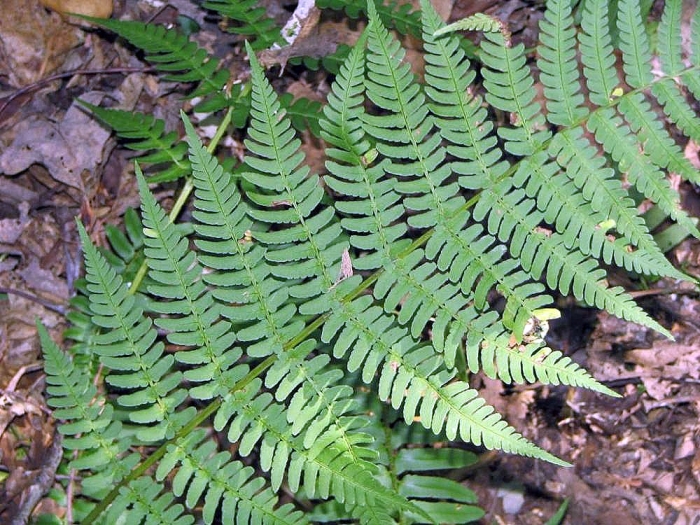Marginal Wood Fern
(Dryopteris marginalis)
Marginal Wood Fern (Dryopteris marginalis)
/
/

Photo by David J. Stang
CC BY-SA 4.0
Image By:
Photo by David J. Stang
Recorded By:
Copyright:
CC BY-SA 4.0
Copyright Notice:
Photo by: Photo by David J. Stang | License Type: CC BY-SA 4.0 | License URL: https://creativecommons.org/licenses/by-sa/4.0 | Uploader: David Stang | Publisher: Wikimedia Commons | Title: Dryopteris_marginalis_2zz.jpg | Notes: VicuñaUploader 1.20 |












































































Estimated Native Range
Summary
Dryopteris marginalis, commonly known as Marginal Wood Fern, is a perennial, evergreen fern native to the moist, shady woodlands and rocky slopes of eastern North America, from Texas to Minnesota and extending to Newfoundland. It typically grows from a clump with a prominent central rootstock, which may be exposed, giving the fern a tree fern-like appearance. The fern reaches 1–2 feet in height and about 6 inches in width, with a dark blue-green, thick, and leathery foliage. The fronds are deeply cut, with leaflets arranged on either side of the main stalk, and the sori are located on the margins of the leaflets, hence the common name. The stipe is grooved on the upward-facing side, dark red-brown at the base, and becomes green further up, covered in bright golden brown scales.
Marginal Wood Fern is valued for its evergreen nature and its ability to thrive in shady conditions, making it an excellent choice for shade gardens, rock gardens, and native plantings. It forms a vase-shaped clump that remains attractive throughout the year. The fern is winter hardy in USDA zones 3-8 and has no serious insect or disease problems. It is best cultivated in part to full shade, with medium water requirements, and adaptable to a range of soil drainage conditions, from slow to fast.CC BY-SA 4.0
Marginal Wood Fern is valued for its evergreen nature and its ability to thrive in shady conditions, making it an excellent choice for shade gardens, rock gardens, and native plantings. It forms a vase-shaped clump that remains attractive throughout the year. The fern is winter hardy in USDA zones 3-8 and has no serious insect or disease problems. It is best cultivated in part to full shade, with medium water requirements, and adaptable to a range of soil drainage conditions, from slow to fast.CC BY-SA 4.0
Plant Description
- Plant Type: Fern
- Height: 1.5-2 feet
- Width: 1.5-2 feet
- Growth Rate: Moderate
- Flower Color: N/A
- Flowering Season: Non-Flowering
- Leaf Retention: Evergreen
Growth Requirements
- Sun: Part Shade, Full Shade
- Water: Medium
- Drainage: Slow, Medium, Fast
Common Uses
Bird Garden, Border Plant, Deer Resistant, Drought Tolerant, Groundcover, Low Maintenance, Rabbit Resistant, Street Planting
Natural Habitat
Moist, shady woodlands and rocky slopes
Other Names
Common Names: Marginal Shield Fern
Scientific Names: , Dryopteris marginalis, Aspidium marginale, Thelypteris marginalis, Dryopteris marginalis f. elegans, Aspidium marginale var. elegans, Nephrodium marginale f. davenportii, Polypodium marginale, Dryopteris marginalis f. davenportii, Dryopteris marginalis var. elegans
GBIF Accepted Name: Dryopteris marginalis (L.) Gray